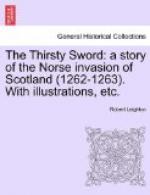Promptly did Kenric thrust his sword between his knees and take his longbow from over his shoulder. Aasta as promptly handed him an arrow. He saw Roderic standing waist deep in the breakers sheathing his sword. He levelled an arrow at his throat, but quickly as the arrow flew Roderic raised his shield. The dart plunged into the hard board. Another and another arrow followed with the same result. Then Roderic, throwing himself into the deeper water, and holding his shield to defend his bare neck, swam outward towards the ships.
No other man in all that host could have breasted those great waves without being dashed to pieces on the rocks. But Roderic MacAlpin was as much at home in the water as upon the dry land, and though Kenric believed that he had but preferred a watery grave to being hacked to death by sword or axe, yet Roderic reached his ship in safety and lived to fight another day.
Kenric, returning with Aasta from the beach, found Allan Redmain, surrounded by many men of Bute, fighting still. There was a great sword cut across his cheek, but his strong arms waved about him unceasingly, smiting down at every blow one of the fair-haired warriors of the North. Then Kenric joined in the fray, swinging his trusty blade to right, to left, and forcing his way to Allan’s side, where he stood his ground over the dead body of Sir Piers de Currie.
That good knight’s splendid armour had caught the eyes of his covetous foes, who were also enraged at the thought of the many doughty Norsemen who had fallen under his mighty blows. Twelve of their best men were victims of his well-wielded battle-axe, and of the twelve were the Norse barons Ogmund Kraekidantz, Thorlang Bosi, Paul Soor, Andrew Nicholson, and King Hakon’s own nephew, Hakon of Steini, all of them most gallant and brave warriors.
But not less enraged were the Scots on their side at the death of Sir Piers, whose body now became the centre point of battle. The Norsemen strove to gain possession of his armour, and piece by piece they carried it away. But ever the Scots bore down upon their foes. Swords, pikes, and axes dripped with the crimson drops of battle, arrows and heavy stones fell in the midst of the contending forces; the groans of the wounded, the lusty shouts of the deep-throated combatants sounded loud above the raging of the wind and the thunderous beating of the waves.
Very soon the foemen shrank away, leaving a great gap in their lines through which the Scots cavalry charged, driving the Norsemen to their ships, or forcing them into the turbulent sea.
At the head of the cavalry rode the Scottish King with his valiant steward at his side. But little did the horsemen do, for the enemy, already routed by the defenders, and further dispersed by the tempest of wind and hail, gave up the fight. Many scrambled upon their boats and pushed off from land, and very soon there was scarce a living Norseman to be seen upon the strand.




